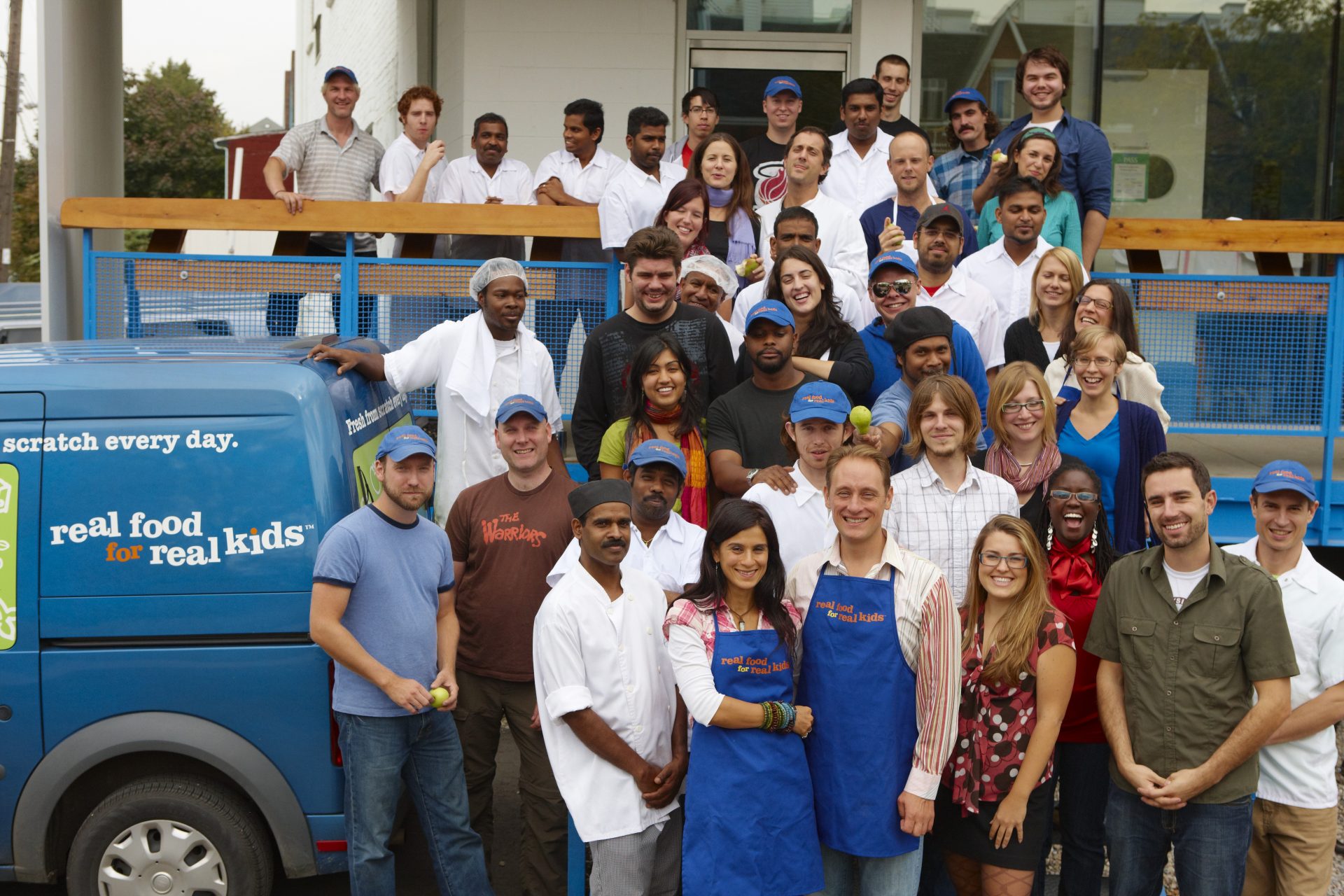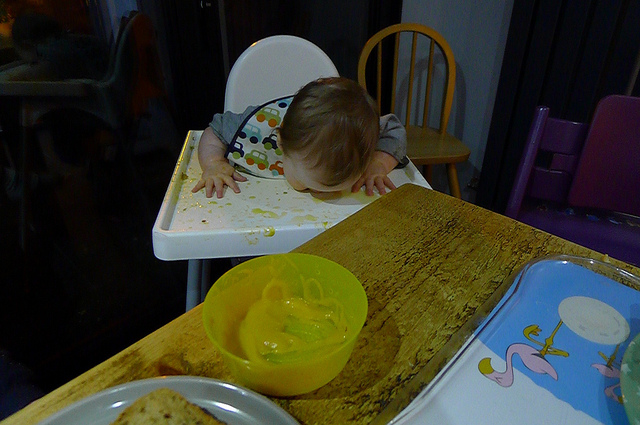In this month’s Raising A Healthy Appetite segment we sit down with Lulu Cohen-Farnell to talk about her company, Real Food For Real Kids.
GFR: Hello Lulu, thanks for joining us. For those of those who don’t already know, what is it you do?
LCF: I am a shit disturber. But in a good way! I do my best to bring change where there’s an obstacle to better health for Canadians, especially children. Today’s food landscape is working against us and needs to be reFreshed with new ideas and policies (that are ironically the old values that have been trampled by the industrial food complex).
My ability to effect change and support other food fighters comes from being the disruptive creator at the heart of Real Food for Real Kids. RFRK cooks and delivers delicious, nutritious real food to over 15,000 kids daily (and growing!) in childcare centres, elementary schools and camps.
RFRK grew into a socially responsible food enterprise that inspires health and supports sustainable farming and eating. RFRK has gone a long way since its creation. We have moved our Real Food Kitchen 4 times and have grown from 2 passionate people to over 100 happy and awesome employees, as well as many partners who share our values for a healthy lifestyle.
GFR: And you are also a proud Mother, non?
LCF: Mais oui! In fact, my son Max was my inspiration to start RFRK back in 2004, to provide him and his childcare buddies a delicious, colourful alternative to the factory-farmed, additive-filled, highly processed fare that dominates children’s catering. He’s now 14 years old (I can’t believe it!) and quite a lot of fun. My daughter Siena, 9 years old, is super creative and also inspires me daily to help make the world a better place.
GFR: Now… how did you go about raising a healthy appetite with your children? Let’s start with their very first introductions to food…
LCF: Taste development actually starts at conception as parents pass on their food preference via their shared DNA. When the mother is pregnant, taste develops through the food the mother exposes her child to. This continues with breastfeeding according to what the mother is ingesting. Taste development continues as the child starts eating solid food, so depending on the food choices the parents make, the child’s appreciation for variety of food and flavours, texture etc will continue to evolve and develop. The good news is that change can be made at any given time. Habits can be difficult to change but anything is possible.
The earlier the introduction of various flavours and texture, the more likely the child will become a curious, adventurous eater. Food training is like any other training; it is a daily experience that forms taste buds throughout the formative years. It’s never too late to adopt new flavours and experiences. That comes with trial and error. The parents are there to guide the children’s choices; the children decide on how much they need to eat. Parents need to guide kids through the experiential journey of food. Max and Siena were breastfed for 18 months and then introduced to various purées of both fruits and vegetables, including fresh herbs, spices, all kinds of different oils and vinegars, nuts and seeds, etc.
When they started to show an interest in solid foods around the age of 4-6 months, they were influenced by what I ate. They both have a wide palate and are adventurous eaters within their own boundaries. Max is an omnivore who eats mostly legumes and vegetables but also healthy meats a couple of times a week. Siena was always a vegan. Things may change as they continue to explore and experiment with real foods.
GFR: And what are your thoughts on allergies, intolerances, and the like? How do you feel parents should approach introducing the more common allergens?
LCF: Allergies and intolerances have been on the rise. I believe that they are issues related to our gut health and microbiome; issues such as Leaky Gut Syndrome, Colitis and other colon inflammations are often due to the over prescription of anti-inflammatory drugs and/or the overuse of antibiotics in drugs or in the meat people consume.
Some allergies like peanut or nut allergies can be conquered using protocols where the allergen is introduced in micro doses on a daily basis. That’s one of the reasons why introducing a variety of food at a young age is essential. Other factors can exacerbate allergy intolerances. Sometimes it can be related to how the baby is born. For example, if the baby is born through c-section and not through the birth canal, they don’t get exposed to vaginal bacteria which helps build immunity and a healthy microbiome. Immunity and gut health can be rebuilt at any age following a serious and targeted probiotic protocol or using more recent techniques like fecal implants from healthy individuals. Harmful chemicals contained in vaccines have also been a part of the puzzle relating to the rise in allergies. A child can be born without an allergy and then develop it later on in life. Most of the time we can trace it back to colon health.
At RFRK, we cater to children with varied degrees of allergy sensitivities and severities, as well as intolerances. We do our best to inform parents about allergy protocols and gut health so that they can help their kids to manage and/or overcome an allergy or intolerance.
We also see a rise in lifestyle preferences where families decide to avoid certain foods and ingredients. For example, some families will avoid gluten and dairy as they may not tolerate them or know that our bodies and health are better off without them. When one decides to experiment with their diet and eliminate certain types of food for a given period of time, they may feel better. It’s important to ensure that the food we eat is nutrient dense and fuels our bodies and mind for optimum health. For a very active person, it’s essential to fuel their body according to the level of their energy output.
These are both worth a read:
Food bans – Part 1: Why many medical experts think food bans in schools go too far
Food bans – Part 2: Why are food allergies linked to income?
GFR: With Real Food For Real Kids you probably have to be mindful of allergies all the time. Do you have any thoughts as to why we are now seeing such a prevalence of allergies and intolerances in young children?
LCF: Of course, RFRK has and follows very strict allergies processes and protocols. As part of this process, we track the types of allergies reported to us as well as the frequency of different allergies. And yes, we have seen a tremendous increase in parents reporting some kind of allergy or food intolerance over the past few years especially.
We have noted that allergic reactions to certain foods/ ingredients have increased over the years but so too have the number and frequency of harmful chemicals getting added to our food, hygiene/cosmetics and cleaning products. And there is also the increased use of GMOs and the ever growing number of vaccines introduced at younger and younger ages. Can we draw a parallel here? People also have come to live in a more sterile environment and kids aren’t exposed to the natural environment as much – which basically means that our immune systems are not experiencing the same challenges and developing the same immuno responses that our ancestors would have. With the prevalence of anti-bacterial soaps and detergents, access to good and essential bacteria has been drastically reduced and people are becoming more prone and susceptible to illnesses. And don’t even get me started on the effects of antibiotics on our digestive systems…
GFR: As your children grew older and you moved them to solid foods, how did you develop their palates? And how do you feel that your strategy back then played out with their preferences today?
LCF: I introduced new and varied foods to my children on a daily basis and still do! I have a holistic approach to feeding my kids. Just like me, my kids have grown up eating real food made from scratch from the beginning. They enjoy eating real food and developed a taste for it throughout the years. They are adventurous eaters. Yes they like candy like most kids do, but they have learned and experienced the foundations of healthy eating and delicious eating. One of their favourite things is toasted injera (ethiopian bread made with teff flour) and seaweed! Their tastes continue to evolve as they experiment with food. They often ask if they can help in the kitchen and love to discover new flavours and textures. Of course they don’t like everything, but they are open to trying new foods, that is what matters most. An open mind!
GFR: So do you feel that there is there some kind of playbook to follow to ensure that your child doesn’t become a picky eater and has a diverse palate?
LCF: I believe teaching kids how to eat and appreciate real food is just as important and time consuming as it is to teach them to read, play chess, ride a bike or become really good at a sport. It takes discipline, repetition, practice and creativity. When we teach our kids to read, there are steps we take to do so. We first teach them the alphabet, then words, then sentences. We sit down with them and we read with them. We as parents should feel the same way about teaching our kids how and what to eat. We should take the time to shop for real food, prepare and cook food, teach them table manners, and of course sit down, eat together and share stories. These are sacred moments that allow us to all stay connected in a very disconnected and distracted world.
Paying attention to how we feed ourselves and our kids is an investment in our health and our kids’ well being. It’s being able to see the bigger picture. It’s about not getting frustrated or give up when our kids refuse to eat something. Just like some kids take longer learning to read than others, some take longer to develop their taste buds than others, but we should never give up and label our kids with words like ‘picky eater’ or ‘you never or won’t like’. Instead we should encourage them to embrace new tastes, be curious and yes, sometimes it’s ok if they say no to a food we present. Frequent exposure is what matters.
Banning food our kids sometimes refuse to eat doesn’t help grow their palate or expand their taste buds. In France, we train our kids from a very young age to spend time eating at the table. In every school, it is mandatory for students to learn table manners. French people are not inherently better behaved. Eating a diversity of food with good table manners is daily practice. Sitting at the table (without phones and iPads!) is a way for families to connect with each other. Spending an hour or more eating lunch or dinner is common. Families exchange opinions, speak about their day – and about what they’re going to eat next!!
Eating connects us. It always has. Cooking is an art that used to be passed down, like stories passed on from generation to generation. It’s a lost art that we need to bring back to our society starting in schools with mandatory food literacy and cooking classes..
Knowing real food and how to cook it is an essential life skill that every human being should own. If our kids refuse to taste something, no need to insist too strongly but let’s not replace it with something that is easy (like cereal or bread) that you know kids will like. Always offer familiar and new food together. If kids are hungry, they will eat. Don’t ban a food because it’s not a hit the first time.
GFR: Right now I’m having trouble getting our two and half year old to eat fish… I’m hoping that is just a phase?
LCF: Kids’ palate evolves constantly. If they don’t like something today, they might like it next week. Don’t ban food because it isn’t liked once. Always introduce new foods in different ways, including fish. Have you tried fish in a smoothie?… Just kidding! Try fish cakes or grilled fish in a sandwich with aioli!
Parent’s helpful books:
The Tale Of Kale by Lisa Borden & Joey Storm
(The Tale of Kale is a based on a real story and a real kid, but is meant to be a colourful and happy way to encourage good eating habits, and develop excitement for trying new things. This children’s picture book is perfect for a good cuddle-up-and-read session, and also a great classroom read or addition to your library.)
Kids Needs Real Food (Not Food Products) by Jeanie Marshall
French Kids Eat Everything (And Yours Can Too) by Karen Le Billon
Getting To Yum by Karen Le Billon
And of course: “You Have to F***king Eat by Adam Mansbach
Audio “You Have to F***king Eat
And this website full of better products, suggestions, tips,etc. to help parents be a better informed parent/ consumer faster (aka all the research is done for you) check it out:
|
The Borden Big List – You’ll find everything you should read, wear, drink from… |
GFR: There has been quite a lot of negative press recently about some parents choosing to raise their children vegetarian/vegan from “Day 1”… I’d be interested to hear your thoughts on that subject?
LCF: The media highly exaggerates and dramatizes things around eating a plant based diet and choosing to be vegetarian/vegan… Just like any other diet, a vegan diet can be healthy as long as it’s well balanced. If parents read The China Study by T.Collin Campbell, they may be surprised to learn that they might’ve wanted to feed their kids a vegan diet from day one. Eating plant based foods is easier on the system, especially the digestive system of a young child. One can thrive on a vegan diet healthily without any animal intake as long as they know where to find the nutrients. The plant world is rich and nutrient dense. For examples, legumes whole grains are a great source of protein, and so are mushrooms!.
Look at herbivore horses; they eat hay, grass, vegetables and fruits and are incredibly strong and powerful.. What matters most is feeding our kids a balanced diet rich in real foods and devoid of highly processed foods, whether it’s vegan, omnivore or vegetarian. Following Michael Pollan’s 64 Rules is a good idea. If you’re vegan and tofu is your only go to protein, it’s obviously not a good idea. Again, as with all diets, including a variety of foods is the way to go. Sticking to real food made from scratch is what matters most, no matter what your dietary preference is.
GFR: How did you apply what you had learned through raising your children to what you do at Real Food For Real Kids?
LCF: RFRK was created as an extension of my life, my food values, and my take on real food. At RFRK we cook and promote nutritious delicious real food on a daily basis. RFRK follows a simple rule: cook real food from scratch and avoid food additives, colourants, artificial flavors, preservatives, and GMOs. Use healthy meats and fish grown the way nature intended and use the best quality of uncompromised ingredients
Check out:
64 food rules by Micheal Pollan
GFR: And what have you learned about the children of Toronto’s diets since beginning Real Food For Real Kids? Is junk/processed food as prevalent as I am led to believe?
LCF: A lot of kids are still fed a ton of processed food. It’s difficult to avoid unless you are motivated to do so. Food marketers and big food corporations tell parents what their kids should be eating by marketing food products without kids’ health in mind but rather the health of their company’s bottom line. Parents are left with little time to think about how or what to feed their kids and rely heavily on their doctors or big food corporations to tell them what their kids should eat. Follow your guts, educate yourself, be an informed consumer and stick to real food.
Check out the following links:
http://www.choose-healthy-eating-for-life.com/
GFR: What do you see as being the root cause of malnutrition in children in our society? (And by malnutrition I mean that in its true sense : bad nutrition). I’m guessing that poverty plays a big role in that, but I’m guessing that there are other factors at play?
LCF: Kids aren’t taught how and what to eat. That’s the central problem. Childcare, school administrators and parents are taking short cuts in the name of convenience, putting our kids’ health in jeopardy. Some don’t play their true role as the gatekeeper and acquire the knowledge needed to feed our kids the fuel they need to grow into healthy and thriving adults. The lack of food literacy in a daycare or classroom, the very little time children are given to eat lunch (20 minutes in schools, often in less than ideal settings), cafeterias and lunchrooms that are lacking in healthy food, do not help develop a healthy society. Our health depends on good food with truly nutritious choices. Eating real food is NOT more expensive than eating processed foods. It starts with choosing quality over quantity.
GFR: As a child grows, how much influence do you feel that peer pressure has upon their likes and dislikes?
LCF: Peer pressure always plays a role. That’s why food literacy is greatly important. Having real food everywhere kids go and making that the norm as opposed to processed food is the way to overcome peer pressure. Childcare staff, school administrators, teachers and parents are role models. If every adult in every school and household set a good example of how to eat well, if cafeterias are filled with real food then real food becomes the norm, transforming peer pressure into a positive thing.
GFR: This is great, Lulu… do you have anything else that you would like to add?
LCF: I think the best food advice is timeless. For example, here’s something from a WW1 era poster that still rings true today.
FOOD
1- Buy it with thought
2-Cook it with care
3-Use less wheat & meat
4- Buy local foods
5- Serve just enough
6- Use what is left
Don’t waste it!
(source: Food Don’t Waste It – WWI US Food Administration Ad Vintage-Style Poster)
Or even simpler, by Michael Pollan: “Eat (real) food, not too much, mostly plants.”

Edinburgh-born/Toronto-based Sommelier, consultant, writer, judge, and educator Jamie Drummond is the Director of Programs/Editor of Good Food Revolution… And although it took a while, that was well worth the wait!










